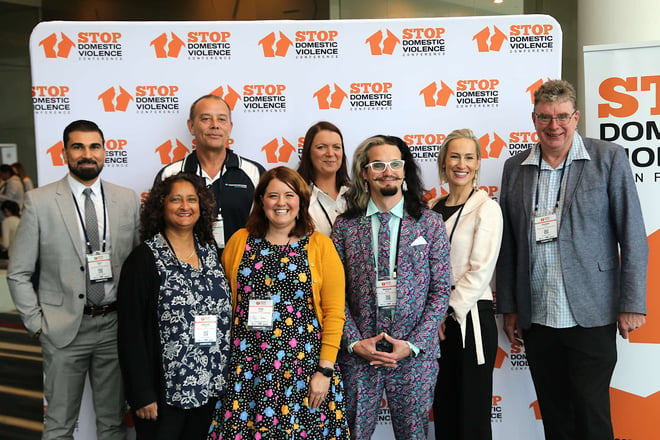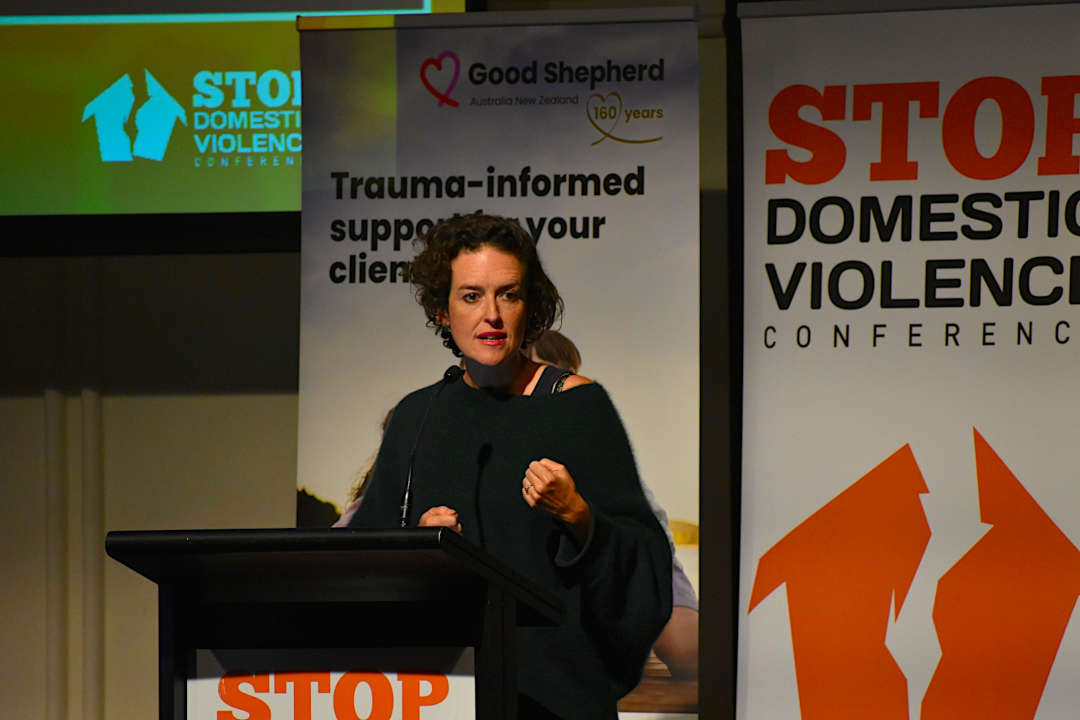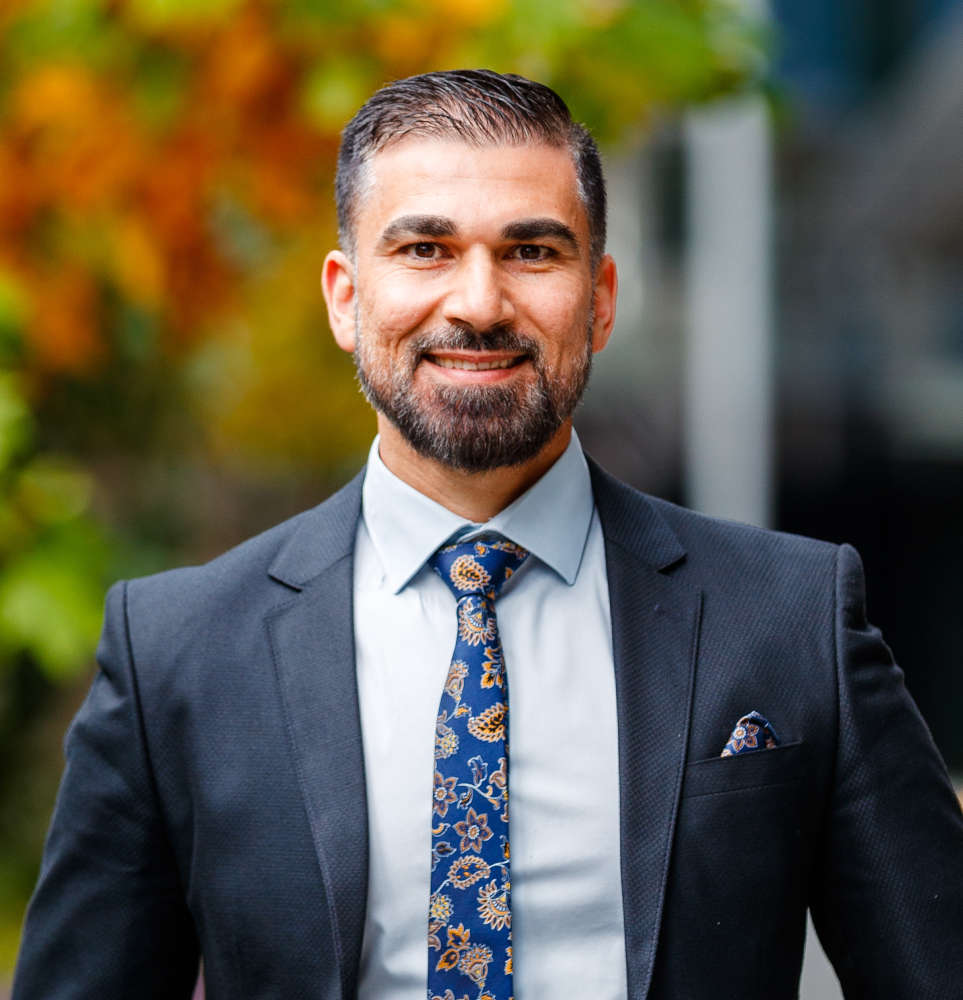Monday 25 - Wednesday 27 November 2024 Adelaide Convention Centre
Stronger Together: Bridging Silos and Building Change
WELCOME
In 2024, The STOP Domestic Violence Conference journeys to Adelaide. Join us and gather with your peers as we reflect on the current obstacles facing us, brainstorm innovations and seek opportunities for change within the family, domestic and sexual violence sector.
Together, we will tirelessly work to end gender based violence.

The SDV Mission
Join us at SDV24 and you can:
- Take part in honest and raw conversations about the most pressing issues of the sector.
- Lend your voice, share your research or real-world insights as a presenter at the conference.
- Be part of the solution to end violence against women and children.
- Gain the information you need to continue to provide solutions and strategies for your organisation, team and community.
SDV provides a platform for government policy and initiatives to update, inform and seek feedback from the people who are delivering the services in the community. To end violence against women and children we will need to work together, with honesty and transparency to create solutions.
- Does this sound like you?
- Is SDV for you?
- What will you gain from attending?
- The fun stuff
Does this sound like you?
Who attends SDV?
Here’s a snapshot of delegates who typically attend SDV:
Now in its 10th year, the STOP Domestic Violence Conference sees an incredible selection of sector leaders, professionals, practitioners, victim-survivors and lived experience gather for 2 days of intentional sharing and learning.
Delegates include:
- Mental Health Leadership, Strategy and Management: CEOs, Directors,
- Managers and Leaders.
CEO, Management: State peak bodies and charities. - Mental Health Medical Professionals: Psychologists, Psychiatrists, Mental Health Nurses, GPs, Clinical workers, Peer workers, support workers, Counsellors, Occupational therapists, Clinical workers, Social workers.
- Management, Service Manager, Team Leader, Case Manager, Support Worker: Community Health Services which offer DFV services (Shelters, Refuges, Emergency Housing, AOD services.)
- Management, Service Manager, Team Leader, Case Manager, Support Worker: Charities
- Protective services: Police.
- Management, Service Manager, Team Leader, Case Manager, Support
- Worker: hospital workers, family court, centrelink, lawyers, rehabilation services including correction and community-based projects, state government departments: DOCS, Housing, Social Services.
Is SDV for you?
If you’re wondering whether this is for you.
SDV is for you if you’re looking for…
- Application based presentations to leave you with practical tools to create immediate and positive changes for yourself, your clients, your community.
- Networking with like-minded sector professionals to discover best practice solutions.
- Inspiration from current research, top professionals and leaders within the family, domestic and sexual violence sector.
- A platform to share your research, services, and case studies with your peers.
- A break away from your every-day to think bigger, more creatively and strategically.
Walk away with these learnings
What will you gain from attending?
SDV is the conference for the sector.
Here’s what you’ll walk away with after your three day STOP Domestic Violence Conference experience in Adelaide:
- Information, data and research around what the sector needs right now, and what the immediate future looks like for you, your role, your community.
- Feeling refreshed with new ideas and innovative approaches to some of the sector’s largest issues.
- Feeling energized by the changing landscape of our sector and your role within it.
- Walk away with an impressive list of ideas and plans which you can reuse, redesign and reimagine for your own work, clients and community.
You’ll also have:
- Access to all recorded keynote presentations (30 days)
- All recorded concurrent presentations (30 days)
- All event printed materials
- Access to the event app
- Over 10 hours towards CPD points
- A certificate of attendance
Here’s what you can expect
The fun stuff
Attend SDV in Adelade and enjoy:
- Exclusive networking welcome function with drinks and canapes
- 5 star catering package for all conference days
- Chillout mindfulness zones
- A pay-your-own-way dinner to connect with your fellow delegates
- The chance to win awesome prizes
- Returning delegate gift if you’ve joined us at previous events
- Introductions to exhibition partners to see the innovations from around the sector
Keynote Speakers


Keynote presenter to be announced soon.

Keynote presenter to be announced soon.

Keynote presenter to be announced soon.
The Program
Stronger Together: Bridging Silos and Building Change
SDV24 Topics (Click to Expand)
-
Fostering Reporting, Support and Resources
- Empowering Voices through Community Initiatives and Shared Experiences
- Building Safe Reporting Mechanisms: Addressing Fear, Shame, Lack of Awareness and Access for Victims
- Addressing Funding Deficiencies and Implementing Economic Interventions.
- Counselling and Support Programs: Bridging Gaps between Mental Health Services and DFSV Services.
- Workforce Wellbeing: Supporting the Mental Health and Resilience of the Sector Professionals
- Avoiding Collusion, Promoting Inclusive, Sensitivite and Respectful Language
-
Enhancing Legal Pathways: Multidisciplinary and trauma-informed approaches to Law Enforcement, Legal Assistance and socio-legal support
- Preventing potential systems abuse and institutional collusion
- Understanding and Addressing Coercive Control: Integrating Trauma-Informed Approaches into Legal Pathways
- Ensuring Timely Legal Intervention and Access to Justice for Victim and Survivor Rights
- Enhancing Legal Responses and Prosecution Strategies for Perpetrators: Promoting Accountability and Incorporating Therapeutic Approaches
- Incorporating Restorative Justice: Strengthening Legal Responses and Healing Trauma
- Social Entrapment and Misidentification: Responding to Retaliatory, Defensive and Resistive Violence
-
Meeting the Needs of Our Diverse Communities
- First Nations and Indigenous-Led Solutions: Recognising and Elevating Resilience of Indigenous Communities
- Cultural, Age, and Disability Factors Contributing to Underreporting in Vulnerable Communities
- Enhancing Service Sensitivity, Accessibility and Understanding for Indigenous, CALD, Refugee, People with Disabilities and LGBTQIA+ Communities
- Promoting Intersectional and Inclusive Practices: Tailoring Support, Creating Safe Spaces and Support Networks for All
- Advancing Australia's Commitments through Global Efforts and International Initiatives
- Internationalising our Work: Australia’s Commitments to CEDAW & DEVAW
- Inclusive Definitions: Rethinking Domestic and Family Violence Definitions for Marginalised Cohorts
- Addressing Forced Marriage in CALD Communities: Understanding the Intersection with Domestic and Family Violence
-
Prevention and Intervention Strategies
- Exploring Targeted Early Intervention and Proactive Prevention Strategies to Combat D&FV
- Strengthening Communities: Initiatives for Preventing D&FV
- What Lies Ahead: Anticipating the Next Breakthroughs Foreseen by Those Directly Engaged in Ground-Level Work?
- Comprehensive Approaches to Perpetrator Intervention and Long-Term Change: Innovating Rehabilitation, Addressing Root Causes and Understanding Perpetrator Motivation
- Expanding Holistic Healing and Recovery Services: Beyond Mental Health in D&FV Intervention
- Recognising Resilience: Shaping Prevention and Responses to Domestic, Family & Sexual Violence
-
Addressing Vulnerable Populations in Domestic and Family Violence
- Childhood Trauma: Effective Intervention Strategies for Young Survivors
- Supporting Children in Crisis: Best Practices for Immediate and Long-Term Care
- Collaborative Approaches: Schools, Communities and Services Uniting for Child Welfare
- Protecting Our Elders: Addressing Elder Abuse within Domestic and Family Violence
- Partnerships and Integration: multidisciplinary operating models integrating multiple types of support
-
Breaking the Silence on Sexual Violence within D&FV
- Revealing the Interconnections: Understanding Sexual Violence within Domestic and Family Violence
- Research on Intimate Partner Sexual Violence (IPSV) and Child Sexual Abuse (CSA)
- Empowering Bystanders: A Key Role in Ending the Silence
- Mitigating Compassion Fatigue and Overgeneralization in Policing and DV Services: Impacts on Victim Recovery
-
Social and Economic Factors, Housing, Homelessness and Safety
- Ending Homelessness through Affordable Housing Solutions and Crisis Accommodation Innovations
- Beyond Shelter: Holistic Approaches to Rebuilding Lives
- Impact of social and economic factors and DFV
- Emerging Challenges: Addressing the Implications of Natural Disasters and Elevated D&FV
-
Addressing Technology-Facilitated Abuse
- Cybersecurity for Survivors: Mitigating Risks of Online Harassment
- Legislative Responses: Adapting Laws to Address Technological Abuse
- Empowering Survivors with Digital Literacy and Safe Technology Skills
- Delving into the Story: Analysing Media and Pop Culture's Impact on Our Perception and Response to FDV in Society

Why the STOP Domestic Violence Conference is the one sector conference to attend
- The STOP Domestic Violence Conference is the largest attended family, domestic and sexual violence sector conference in Australia and New Zealand with over 400 professionals attending each year.
- Now in its 10th year, it is also the longest running conference dedicated to ending Domestic Violence in the Asia-Pacific region.
- 91% of delegates said they would return to the conference.
- The most diverse and inclusive conference on family, domestic and sexual violence in Australia and New Zealand with dedicated streams on topics like Indigenous family violence, violence against elders, abuse within under-represented communities and Domestic abuse and family violence in the workplace.
- The most comprehensive line-up of expert presenters coming together for 3 days to engage, discuss, connect and inspire workers in the family, domestic and sexual violence sector.
- Over 15 hours of CPD hours available upon attendance in person at the conference.
- Trusted and supported by over 3000 passionate leaders from the family, domestic and sexual violence sector.
Committee







Louise Kelly
Deputy CEO | Head of National Services & Development, OARS Community Transitions


Sam Borka
Community Liaison Officer, Multicultural Policy and Engagement, Strategy and Programs, NSW Department of Communities and Justice

Julianna Marshall
Policy and Education Manager Central Australian Women’s Legal Service Regional and remote perspective; anchored to national Policy






Benjamin O'Neill
Deputy Director Helpline, Incidents and Welfare Policy., Defence Member and Family Support

Join Us
Registration Options
$ 499 + GST
Virtual
Save $110 with Early Bird. Ends 18/10/2024.
- Live streaming of all keynote presenters
- Live streaming of all sessions in the plenary room over three day conference period
- Virtual presentations
- Complete online access to audio and visual presentations for 30 days*
Over 15 hours towards CPD points - Your personalised certificate of attendance
$ 1,199 + GST
In-Person | 3 Day Program
Save $330 with Early Bird. Ends 18/10/2024.
- All keynote presentations
- All concurrent presentations
- Discounted accommodation rates
- Access to conference app
- 5 star conference catering package
- Access to exclusive networking functions
- Complete online access to audio and visual presentations for 30 days post-event
- Printed conference materials
- Over 15 hours towards CPD points
- Your personalised certificate of attendance
- Exposure for your organisation
- Plus, chances to win great prizes!
$ 3,297 + GST
In-Person Group of 3
Save $330 with Early Bird. Ends 18/10/2024.
- All keynote presentations
- All concurrent presentations
- Discounted accommodation rates
- Access to conference app
- 5 star conference catering package
- Access to exclusive networking functions
- Complete online access to audio and visual presentations for 30 days post-event
- Printed conference materials
- Over 15 hours towards CPD points
- Your personalised certificate of attendance
- Exposure for your organisation
- Plus, chances to win great prizes!
“It's amazing - this conference brings together so many different services and approaches.”
“So many excellent speakers & topics. It's been an encouraging, inspiring & helpful conference.”
“Informative, inclusive and insightful. Was a wonderful experience!”
"Good variety of keynote and workshop topics.”
“Variety of information and presenters - current and relevant.”
“Overall it was a wonderful conference. I love the agenda of discussion. Learning opportunities from different sectors.”
“Excellent event, great program, rich range of presentations”
“A lot of expert perspectives and information. A lot of different organisations especially interesting e.g. men as victims programs etc.”
Where It's Happening
VENUE & ACCOMMODATION
NOVEMBER 25-27, 2024
ADELAIDE CONVENTION CENTRE


Holiday Inn Express Adelaide City Centre
(Price includes GST)
| Run of House - Includes FREE Express Start Breakfast – served daily in The Great Room | $215 per night |
Accommodation is optional and can be booked during registration.
OUR Partners
Sponsors
Get In Touch
